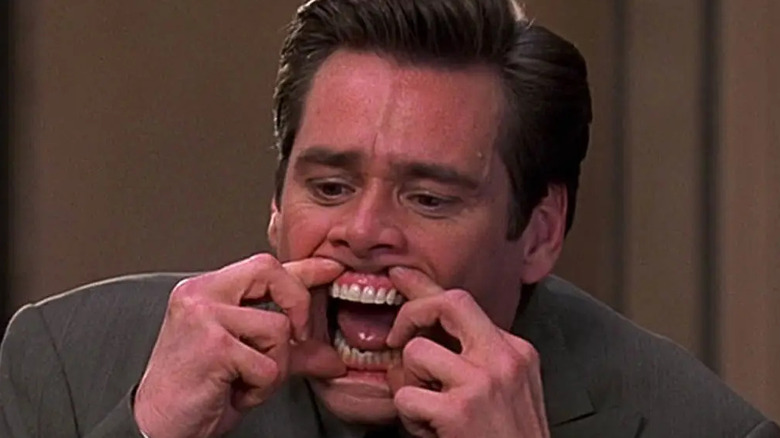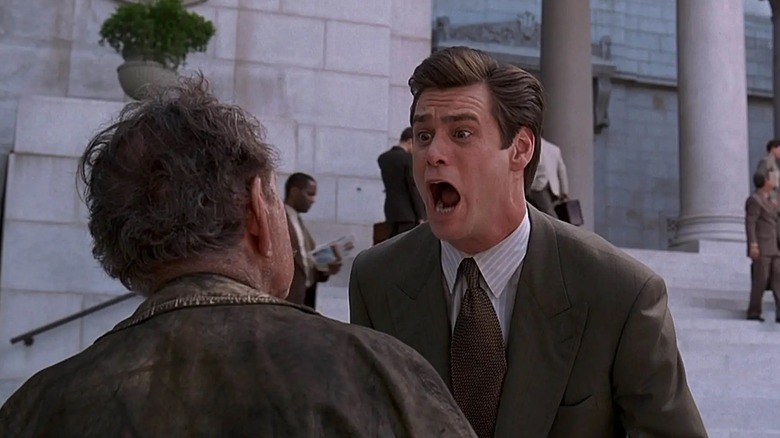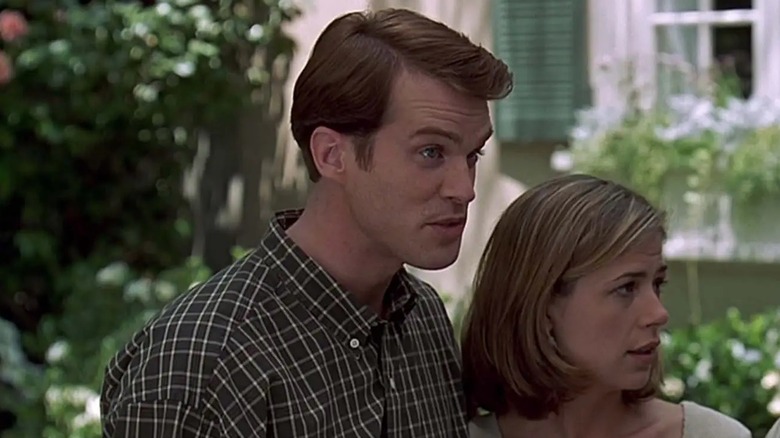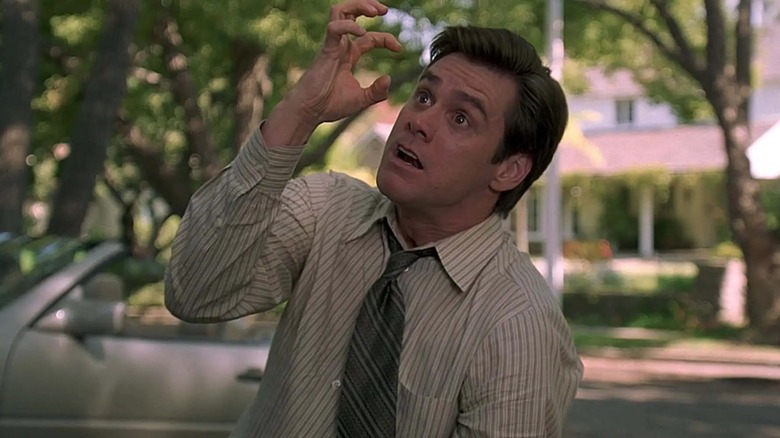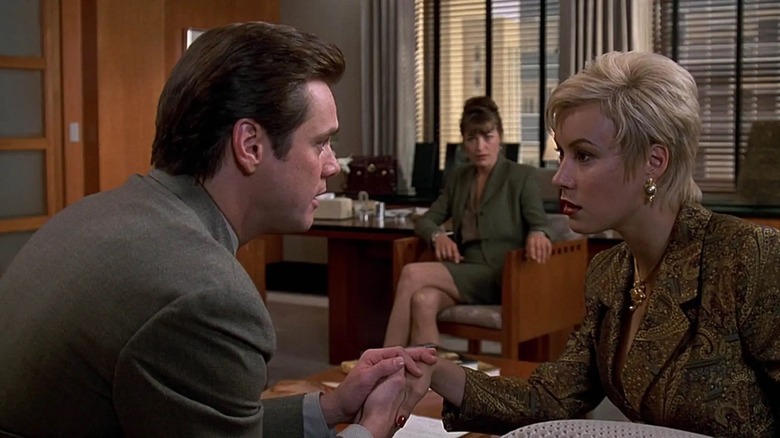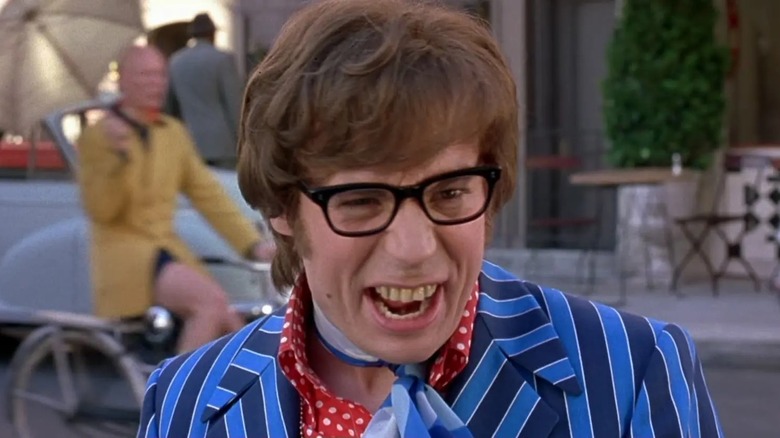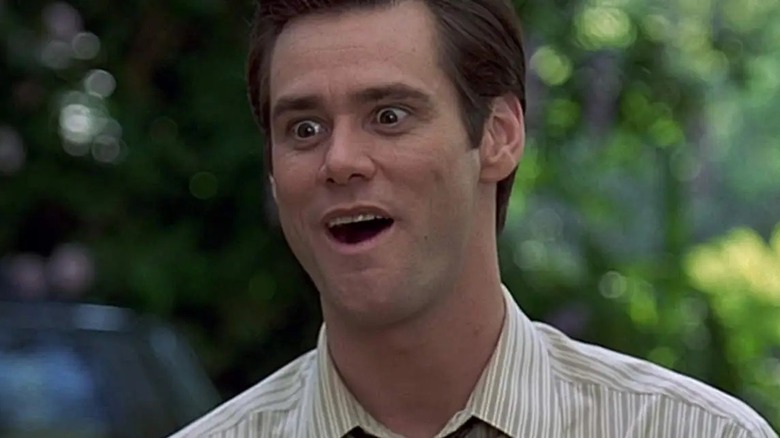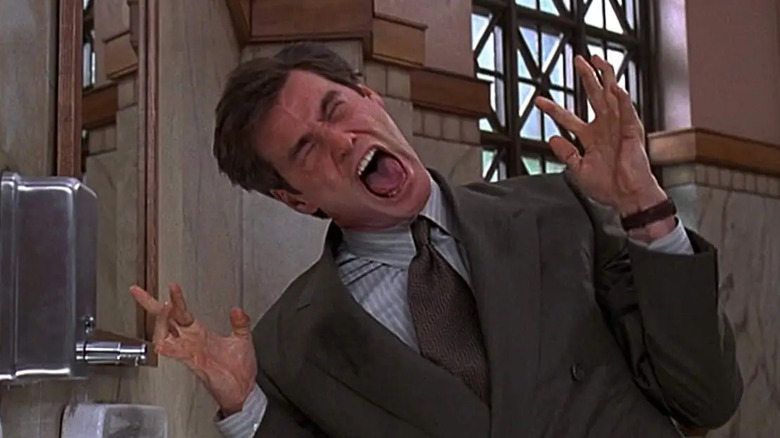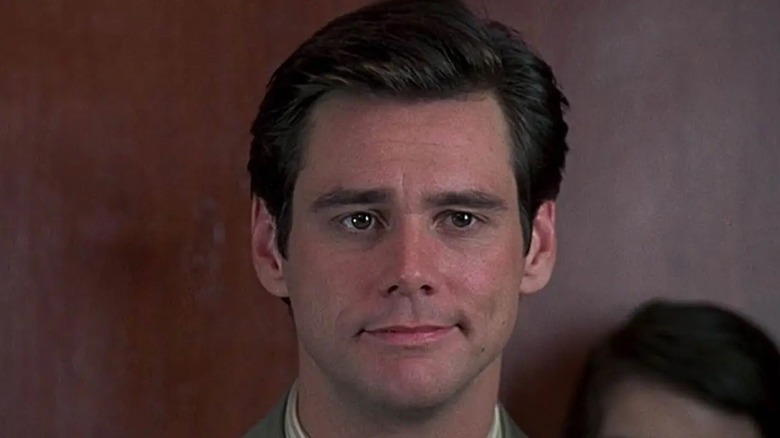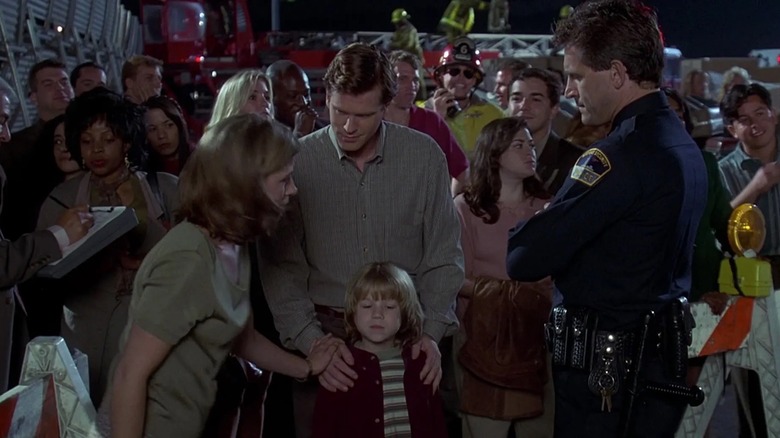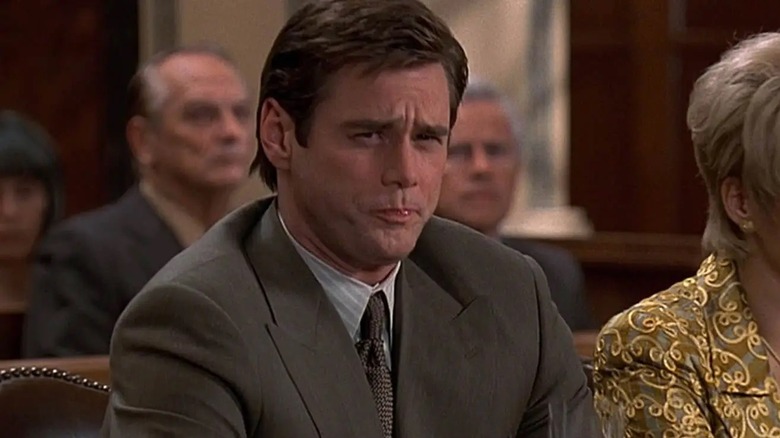The Untold Truth Of Liar Liar
Why can't a lawyer cross the road? Because they like to lie on both sides. It's a terrible joke, but it sums up the unique premise of 1997's "Liar Liar" — what happens to a lawyer when they aren't able to bend the truth any longer? While most legal professionals will point to this as being nothing more than a cruel stereotype of their profession, it made for an entertaining movie, starring Jim Carrey. It also paired him up with director Tom Shadyac once again, after they had delivered a blockbuster hit in the form of "Ace Ventura: Pet Detective."
From the outside looking in, "Liar Liar" appeared like a whale of the time where everyone experienced a good chuckle. While the humor certainly flowed, the making of the film had its own challenges, such as stories breaking out about Carrey's behavior on set to the actor almost knocking himself out for a scene. So let's dive right in and discover the untold truth of "Liar Liar."
Jim Carrey screamed on set before scenes and it made headlines
The role of Fletcher Reede in "Liar Liar" was a physical one for Jim Carrey. While he wasn't dancing around to "Cuban Pete" like in "The Mask" or talking out of his rear end like in "Ace Ventura," he had to demonstrate how the inability to lie turned Fletcher into a nervous wreck. In an interview with The Los Angeles Times, Carrey admitted that he didn't expect it to be such a physically demanding role; however, he had to apply his own form of method acting to get into character by screaming and pulling faces before the camera rolled. Unfortunately, to outsiders, it appeared as if the comedian was embracing the diva side of Hollywood life and letting rip on set.
"We had a little story come out on the set about me screaming and yelling before a take," Carrey said. "A story came out in the Globe about how I was out of control. So for a couple of days I was kind of calm, and Tom [Shadyac] said, 'You know what? Don't even listen to that stuff, man. Just scream your head off if you need to.'" Carrey added that it wasn't a case of him shouting at any specific person but merely a way he prepared for a demanding scene.
Judd Apatow was a script doctor for Liar Liar
Judd Apatow's name is synonymous with comedy films from the 2000s onwards; however, he was already building up a name for himself as a talented comedy writer in the '90s. Not only was he a scribe for "The Ben Stiller Show" and the animated series "The Critic," but he was also doing uncredited rewrites for major Hollywood films. One of the movies that benefited from his word surgery was "Liar Liar," as per The Los Angeles Times.
Apatow didn't receive a writing credit for his work, so it is unknown how much of the final script he ended up contributing to. However, this wasn't his first time working with Carrey. Apatow had written several sketches and jokes for the rubber-faced comedian in the past and even produced 1996's "The Cable Guy," which starred Carrey as the titular character. At the 2017 Just for Laughs festival (via The Hollywood Reporter), Apatow declared that Carrey was a gifted comedian and one of the funniest people he had ever witnessed in his life. Seth Rogen must still be processing this betrayal.
Cary Elwes got his role purely by chance
Actor Cary Elwes has featured in numerous films that have afforded him notability, even outside "The Princess Bride." Nowadays, most people might remember him as Dr. Lawrence Gordon from the "Saw" franchise; however, Elwes had quite a successful stint in comedy movies before he became a horror personality. He was the titular hero in the Mel Brooks cult classic "Robin Hood: Men in Tights" and he was Jerry in "Liar Liar," aka the guy who made a hilariously terrible impression of The Claw.
As it turns out, Elwes' casting was simply a case of being at the right place at the right time, and not something that he went actively looking for. "That role came about really by pure chance," he told The A.V. Club. "I was talking to Jim Carrey about what he was doing next, and he happened to be talking to Tom Shadyac, the director, and they discussed that I might be right for that role with each other and so it just kind of fell into place for me." Who knows, if he had spoken to Carrey around 1994, he might have been cast as the Harry to his Lloyd in "Dumb and Dumber."
The Claw held deep personal meaning to Jim Carrey
One of the more endearing aspects of "Liar Liar" was witnessing the close relationship of Fletcher and his son, Max (Justin Cooper). Even though Fletcher let down Max on many occasions, they still had a tight bond and would enjoy their precious time together. A memorable scene from the film featured Fletcher making his son laugh by contorting his hand and tickling him with it, referring to it as the Claw. For the audience, it looked as if the Claw was either an improv by Jim Carrey or something clever the screenwriters, Paul Guay and Stephen Mazur, had devised.
As revealed in an "Entertainment Tonight" segment, the Claw was actually created by Carrey's father, Percy. He discussed how his father's hand would get a life of its own and do things to entertain him and his siblings when they were younger. Carrey also revealed that he borrowed a lot of his father's unique quirks and mannerisms for many of his on-screen characters.
Jennifer Tilly learnt from her co-star
Actress Jennifer Tilly had a hilarious and striking role as Samantha Cole in "Liar Liar." She portrayed an unfaithful wife who sought out Fletcher's services for her divorce battle, knowing full well that she had been in the wrong but wanted to win regardless. Tilly played the part exceptionally well, with even The Hollywood Reporter's review reserving special praise for her rousing performance.
Tilly was no newcomer to Hollywood at this time, though. In fact, she had received an Academy Award nomination for her performance as Olive Neal in "Bullets Over Broadway" in 1994. Yet, even she felt as if she learnt something new on set with Jim Carrey. Celebrating the 25th anniversary of the film, Tilly took to her Instagram account to praise her co-star, writing: "Every day watching [Jim Carrey] was a master class in physical comedy. With Jim even a simple task like pouring a glass of water would become a virtuoso performance."
Jim Carrey turned down Austin Powers for Liar Liar
"Liar Liar" might not be mentioned in the same conversation as "The Mask," "Ace Ventura," or "Dumb and Dumber" when it comes to the most iconic Jim Carrey film, but it was an important film for the actor at the time. He had come off mixed receptions towards "Batman Forever" and "The Cable Guy," and needed a hit to prove the critics wrong and to demonstrate that his best years weren't behind him. "Liar Liar" was exactly that, bringing in over $300 million at the global box office (via The Numbers) and since garnering an 83% critical approval rating on Rotten Tomatoes.
However, Carrey could have been showing up in a much different film in 1997. According to Splitsider, the actor turned down the opportunity to appear in "Austin Powers: International Man of Mystery." Carrey was offered the part of Dr. Evil by Mike Myers, who wasn't interested in playing the multiple characters at that point. Reportedly, Carrey was keen to take on the role of the evil genius who loved lasers and nefariously petting cats, but he had to say no because of his prior commitments to "Liar Liar."
The director revealed the truth about Jim Carrey's improv skills
Due to Jim Carrey's comedic talents and ability to deliver unforgettable moments in films, directors tend to give him space to improvise his scenes and freestyle when he chooses, since they know he has the ability to create magic. Filmmaker Tom Shadyac has worked with Carrey on several projects, so he has a better understanding of the actor than most. In a Reddit AMA, Shadyac revealed that the actor does improvise a lot, but there's a lot more that goes into his process than simply being goofy for the sake of it.
"Jim is an incredible improviser," he said. "He's flat out a genius when it comes to creating fresh moments during a scene. And yes, he improvises a lot. But that's always after he's thought about the script from every angle. So he does his homework, considers every written choice, acts the written choice for us, then is free to let it rip!"
Jim Carrey really beat himself up in the bathroom scene
To this day, one of the most talked-about scenes in "Liar Liar" was when Fletcher beat himself up in the court bathroom to try and avoid the trial. It looked violent and aggressive to the audience, but most of us presumed it was all about the smart camera angles and some movie magic that made it look so intense. According to Cary Elwes, Carrey not only improvised a bulk of the scene, but he also put his own health and safety on the line for it.
"He actually — you can hear it — his head hit the concrete stage floor," Elwes told The A.V. Club. "They left the sound on the soundtrack. We all jumped up and were worried for him, but he was fine. He went right into another take." In a conversation with The Los Angeles Times, Carrey admitted that the film took its physical toll on him and he would go home feeling extremely tired after the shoot. Well, he was punching himself in the face and throwing himself into walls, so was he really that surprised he'd feel the aches and bruises afterwards?
Jim Carrey told the cast that he was going to play the role like Gary Cooper
The late Gary Cooper was a celebrated actor in showbiz. Instead of being over the top or trying to disappear into his characters, he believed in the art of subtlety and minimalism. Less was more for him, as he allowed the pockets of silence to speak volumes. When it came time to film "Liar Liar," Jim Carrey spoke to his co-stars and explained that he was going to take inspiration from Cooper's performances and apply a similar approach to the role of Fletcher.
Speaking to Running Wild Films, actor Mitch Ryan, who played Mr. Allan in "Liar Liar," revealed how filming was a hoot with Carrey. "What was so interesting about it is that he got us all together the first day and said, 'You know, if this was the old days, Gary Cooper would play this part. It would be magnificent, the kind of force that he would do, and it would be wonderful. And I want to do it like that. I'm gonna knock off all the shtick and just play the situation because the situation is incredible,'" Ryan said. "First day, he started his stuff [laughs]. He didn't back away from it one bit." Carrey really tricked his cast there, didn't he?
The In Living Color tribute
While Jim Carrey's ascension to superstardom came when he hit the jackpot with the one-two-three combo of "Ace Ventura," "The Mask," and "Dumb and Dumber" all in 1994, people who had tuned into "In Living Color" would have known what he was capable of. Most viewers remember his infamous Vanilla Ice parody of "White, White, Baby" on the show; however, he also had an equally hilarious ongoing skit as Fire Marshal Bill.
Neither Carrey nor Tom Shadyac forgot the comedian's roots. In "Liar Liar," Fire Marshal Bill was brought back to life — but not in the way that most fans would imagine. The character appeared in a blink-or-miss-it cameo towards the end of the film. While Fire Marshal Bill didn't have a speaking line and the Easter egg was likely missed by most "In Living Color" fans, it was still welcome to see the injury prone character pop up again.
Fletcher's lawyer logic was creative but correct
When Fletcher took on Samantha's case, it was a tough sell. There was a tight prenuptial agreement and she admitted to infidelity, but she still wanted to win the case in court. Fletcher defended her behavior by pointing out a different angle where her husband wasn't around for her and failing to give her attention, which drove her into the arms of another man (or, in this case, seven). This logic may have sounded like it would fail to hold up in court, but it technically wasn't.
LegalEagle analyzed pivotal scenes from "Liar Liar." Attorney Devin J. Stone pointed out that while Fletcher's logic is a creative interpretation of the facts, there's nothing legally wrong with it. It doesn't breach Rule 3.3 of Professional Conduct and it is his way of defending his client. However, Stone added that Fletcher's reasoning would likely not win him the case in the court of law, especially if the prenuptial was in place.
